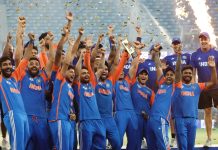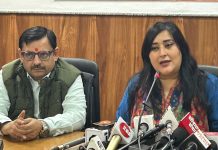
For once, N Srinivasan, the controversial head of International Cricket Council and former president of Board of Control for Cricket in India (BCCI), has decided to put his right foot forward. Unfortunately, he forgot that in cricket a right-hand batsman needs to put his left leg forward to play the dream-like Tendulkar-kind straight caress past the fast bowler. Inevitably, Srinivasan was caught in all forms of tangles as he skipped, slipped and skidded over the turf.
The issue was a straightforward one. The Supreme Court had directed Srinivasan to distance himself from his Indian Premier League (IPL) team, Chennai Super Kings (CSK), or he couldn’t continue as the BCCI president due to issues of “conflict of interest”. In March 2015, the controversial icc head did not contest in the Board of Control for Cricket in India (BCCI) elections and Jagmohan Dalmiya, another contentious figure, regained the post after several years. The latter, however, allowed Srinivasan to continue as the ICC chairman.
In a bid to stay away from further troubles, Srinivasan stuck his right foot forward. In 2014, Indian Cements, decided to demerge the IPL team, which functioned as one of its divisions, into a fully owned subsidiary. In February 2015, the company’s board decided that the existing shareholders of India Cements, including Srinivasan and other promoters, would get shares on a pro-rata basis in the new subsidiary, Chennai Super Kings Cricket Ltd (CSKCL).
This implies that investors, including the promoters, i.e. Srinivasan and family members, would get one share in the cskcl for every one share held in India Cements. With his stake at just over 28 percent in India Cements, Srinivasan would get a similar share in cskcl. Therefore, the icc head had to take the next step forward to detach completely from the ipl team. India Cements decided that the promoters’ (read: Srinivasan and family) stake in CSKCLl would be transferred to public trusts, whose trustees would be “independent” and “unrelated”. So far it sounded quite good.
How the bcci bungled
The machinations began when the ipl governing council agreed that India Cements had “sold” csk to cskcl for a mere 5 lakh. According to the ipl franchise contract, India Cements agreed to pay 5 percent of the sale proceeds, or 25,000, to bcci. This happened in February 2015, or before Dalmiya became the new president of the BCCI in the next month. All hell broke loose in April 2015 when the new ipl governing council, which included Congress politician Jyotiraditya Scindia leaked this to the media.
It was alleged that the previous BCCI dispensation, which owed allegiance to Srinivasan, helped the latter to arm twist, short-change and cheat the Board. The reason: the ‘real’ value of CSK was Rs 1,500 crore to Rs 2,000 crore and, therefore, BCCI’s 5 percent share should be Rs 75 crore to Rs 100 crore, and not a token amount of Rs 25,000. In 2013, a global consultant had valued CSK at more than $50 million, or more than 300 crore. But this seemed a gross undervaluation, as two new IPL teams – Pune and Kochi – were sold for $370 million ( 2,220 crore) and $333 million ( Rs 1,998 crore), respectively, in 2010.
CSK is possibly the most profitable ipl franchise; in 2013-14, it earned an income of more than Rs 166 crore. The team’s profits aren’t disclosed in the 2013-14 annual report of India Cements since the “costs involved in operating the franchise like remuneration to the players, travelling and accommodation expenses, advertisements and promotions… are grouped under the natural heads of accounts”, or clubbed with the company’s overall expenditure on salaries, travel and advertisements. However, experts estimate CSK’s annual profits at over Rs.50 crore.
Only after the matter became public did the BCCI working committee refer the matter to a legal team before deciding how to value csk and, therefore, its share of the proceeds. However, the solution to the vexing problem is simple. Once India Cements allots shares on a pro-rata basis in CSKCL to its existing shareholders, the latter will automatically get listed on the various stock exchanges. The market will immediately discover the real price of the new stock, or the value of the new company. The BCCIi can ask India Cements to pay 5 percent of the average stock price of cskcl in the first six months. For the BCCI, it is critical to note that India Cements is in dire financial state. As per its 2013-14 balance sheet, the company incurred a huge loss of over 160 crore. Given this financial mess, the company will find it tough to cough up the Rs 75 crore to Rs 100 crore as BCCI’s fees.
Sloppy stock exchanges
In its defence, India Cements said it never wished to cheat the BCCI. The 5-lakh figure was not the value of the sale of the CSK to the CSKCL, but the share capital of the latter. According to sources, the new company’s capital comprises 50,000 shares of 10 each, and the figure could have been 10,000 shares or one lakh shares. It was just an amount plucked from the air. Thus, the BCCI should not get hassled by it. However, the question remains: did the previous ipl governing council consider this as sale proceeds in its February 2015 meeting?
What’s more critical are the lapses by the Bombay Stock Exchange (BSE) and National Stock Exchange (nse), who demand adequate disclosures from the companies, such as India Cements, which are listed on them. So, did Srinivasan give full information to the exchanges about the demerger of the CSK, the formation of the CSKCL, and the sale value or share capital of the new company?
At the annual general meeting in September 2014, India Cements said that “the board of directors of the company at the meeting held on 26 September 2014 approved the proposal to demerge CSK BCCI-IPL Franchise 20/20 Cricket Tournament Team into a wholly-owned subsidiary of the company by transferring its net assets at cost. The effective date of transfer will be 1 January 2015. Accordingly, a new wholly-owned subsidiary, by the name Chennai Super Kings Cricket Ltd, is in the process of getting incorporated.”
Later, on February 11, 2015, the India Cements Board faxed the details of the minutes of that day’s meeting to the bse and nse. The third and last point in the letter read: “Our Board also approved a proposal for reorganisation of Chennai Super Kings Cricket Limited, our wholly- owned subsidiary, under which the ownership of the Franchise will be held by the shareholders of The India Cements Limited. This will be subject to all the necessary approvals.”
This was it, and it raised several issues. Why did the bse and nse not ask for more details? Why was the 5-lakh capital structure of the cskcl not disclosed to the exchanges, if this was indeed the case? Why did the exchanges not ask questions about the price at which the team was transferred to the new subsidiary, or the details of the proposed “reorganisation”? Are there loopholes in the disclosure norms of the exchanges, Companies Act and Securities and Exchange Board of India (SEBI), the market regulator?
BCCI, Bookies & Spies
Tapping of telephones, meetings with bookies, hiring of spies, and information hidden from key protagonists in international cricket! It is all a part and parcel of a new exciting potboiler — BCCI versus ICC versus BCCI. It started hours before the BCCI
Working Committee met to debate the sale of Chennai Super Kings (CSK), an ipl team owned by ICC chairman and former BCCI president N Srinivasan. It was aimed at Anurag Thakur, secretary, BCCI, and a sworn enemy of Srinivasan after the latter unsuccessfully tried to stymie the former’s election in March 2015.
A photograph and letter was leaked to the media. The first showed Thakur giving a piece of cake to a well-known celebrity-businessman, Karan Gilhotra. The letter was sent by the ICC to BCCI, and warned that Gilhotra was on its list of suspected cricket bookies and, therefore, Thakur should keep away from him. While the bcci meeting was on, and rejected the CSK sale price, Thakur’s loyalists hit back. Their leaks claimed that Srinivasan had hired detectives and spies to monitor investigations against him as also his enemies within the BCCI.
Twenty-four hours later, Thakur launched his second missive. He wrote a letter to the icc chairman, and lambasted him. He agreed that he knew Gilhotra, but wasn’t aware that he was a suspected bookie. The icc list, he claimed, was not shared with him or BCCI. In fact, he urged Srinivasan to share the same list with his family members. It was a brutal dig at the betting and match-fixing charges against Gurunath Meiyappan, who is Srinivasan’s son-inlaw. Thakur hinted that the photograph and icc letter were leaked by Srinivasan’s friend.
According to Thakur, Srinivasan “has not reconciled” with his victory in the March 2015 bcci elections. Detaching himself from the controversy, Srinivasan said he was in London and wasn’t aware of the leaks and that he will write a personal letter to Thakur. An email leak proved that the ICC had shared information about Gilhotra with the bcci, but Thakur was not marked on it.
The real tussle, however, between Srinivasan and Thakur is about the former’s future. Weeks ago, Thakur hinted the bcci could choose a new representative to head the ICC. In other words, it would end Srinivasan’s ambitious career as a cricket administrator since he is already out of BCCI.
ALAM SRINIVAS
Oblivious Supreme Court
In its latest order, the apex court appointed a new committee to look into focussed questions on the 2013IPL match-fixing scandal that involved Srinivasan’s son-in-law, Gurunath Meiyappan, and the “conflict of interest” issue. Did this committee question India Cements of the CSK demerger, formation of the CSKCL, and the transfer of promoters’ shares in the CSKCL to public trusts? If yes, was the Supreme Court informed or aware of these developments? If yes, shouldn’t the committee or the court have asked for more details on the transfer of assets, share capital, and pro-rata allotment?
To prove that it has cricket’s best interests in mind, and to resolve the issue finally, the apex court should immediately seek these details from Srinivasan, BCCI and India Cements. If this is done, the details will be available publicly in a clear and transparent manner. More importantly, Srinivasan will not be able to work behind the court’s back to serve his selfish interests.

The court should insist that the public trusts, which will own the promoters’ shares in the CSKCLl, should be at an “arm’s length” from Srinivasan and India Cements. None of the trustees should have personal, business or other links with either the company or its promoters and family members. The best possible solution will be that the trustees are either former cricketers, or those who have served the game in a gentlemanly manner in the past. However, such individuals should also delink themselves from the BCCI, state cricket associations and any other cricketing commercial interests.
Knowing Srinivasan, and keeping in mind his past actions, he is likely to exploit legal loopholes in the near future. It is obvious that he wants his foot in both cricket administration and cricket commercialisation, i.e. head the BCCI and also own CSK in some way or the other. Only if the crucial stakeholders — BSE, NSE, SEBI and Supreme Court — work in unison can they force Srinivasan to put his left leg forward or the right leg backward to play the front-foot or back-foot drives that will delight hundreds of millions of cricket enthusiasts in India and abroad.
editor@tehelka.com













